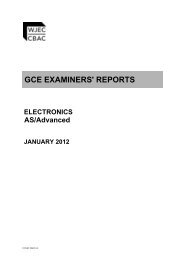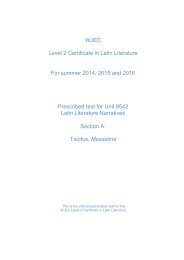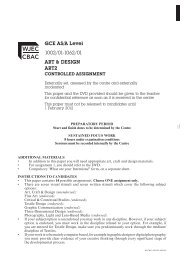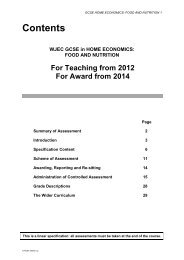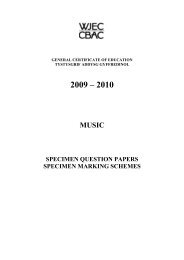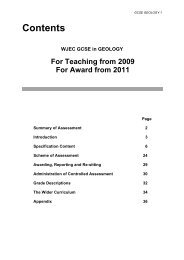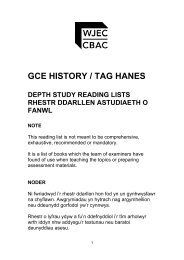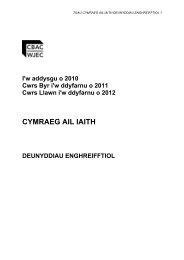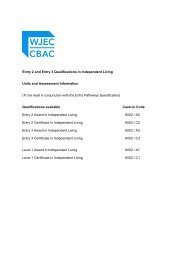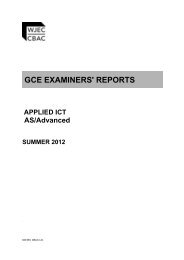WJEC ENGLISH LITERATURE
WJEC ENGLISH LITERATURE
WJEC ENGLISH LITERATURE
Create successful ePaper yourself
Turn your PDF publications into a flip-book with our unique Google optimized e-Paper software.
is perhaps not as acute as Victor’s. As critics comment: it is the depth to which Victor sinks<br />
that makes him so great; he suffers in a way that the reader can not even conceive of.<br />
In contrast, however, we can also understand that Victor’s suffering is self-inflicted. In this<br />
way we are aware that Victor brings about his own downfall. Victor rejects his family,<br />
lamenting the “silken cord” that suffocated his childhood and in that image acknowledges<br />
that his family spoiled and indulged him; Victor has an idyllic childhood, but rejects it. His<br />
desperate need to leave the private sphere, hints at an inability to develop relationships. In<br />
the 1818 version of “Frankenstein” Elizabeth and Victor are cousins and this has lead critics<br />
to speculate about the incestuous nature of the relationship. Certainly, the dream of kissing<br />
Elizabeth in which, “her features appeared to change, and (he) thought he held the corpse of<br />
(his) dead mother in (his) arms” suggest an unresolved and perhaps inappropriate blurring<br />
between his mother and future wife. In this way, we can read Victor’s experiments as an<br />
attempt to usurp the role of women, making his creation inevitably an unnatural monster.<br />
Victor is characterized, in many ways, as arrogant and foolish; a man who deliberately<br />
occupies the periphery of society. Bernard in “Brave New World” is a character who displays<br />
similar contemptible traits and could be said to create his own suffering. Like Victor, he is<br />
self-indulgent and self-obsessed. Bernard even remarks that John is his “victim” friend and<br />
that, “One of the principle functions of a friend is to suffer”. Bernard’s friendship with John is<br />
self-seeking and he wants to use the savage to garner popularity. This parallels Victor, who<br />
describes how “No father could claim the gratitude of his child so completely” as he will with<br />
his creation, hinting that his motives are not altruistic, for the sake of humanity, but are in fact<br />
egotistical.<br />
Victor sets himself upon a dangerous and destructive path and his hubris means that he is<br />
unable to recognise his own failings. Victor’s disappointment on beholding the monster, and<br />
his description of the “catastrophe” in the creation of a “wretch” seem naïve given that he<br />
expressed doubts about his own process and whether he should “attempt the creation of a<br />
being” like himself; Victor misappropriates the “new” science and goes too far. In “Brave New<br />
World” this misuse of science is mirrored; Huxley was incredibly suspicious about “false<br />
science”; those theories, like Freud’s, that purport to explain all human behaviour without<br />
taking into account individuality and difference. Science, for Huxley, should be dynamic, but<br />
in the World State science is used to create stability and inertia. The lack of consideration for<br />
difference is satirized in the Hatchery, “The bulging ranks of row on receding row and tier<br />
above tier of bottles glinted” and Huxley’s contempt for this process is highlighted in the<br />
images of death that are used to describe the Conditioning Centre, “The light was frozen,<br />
dead, a ghost” and hands are “gloved with a pale corpse-coloured rubber”. It is ironic that a<br />
location where embryos are developed is described in terms of death and decay, indicating<br />
that this is an entirely dehumanizing experience and process. We can, therefore, appreciate<br />
that both texts can be read as a critique of “false science”. We understand that Victor is at<br />
the forefront of scientific endeavour, but as critics have suggested, he fails when he does not<br />
take responsibility for his actions.<br />
Ultimately, if we are to consider suffering in the novel, perhaps we should turn to the<br />
monster’s experience. The monster can be considered the most isolated character in<br />
Shelley’s novel. From the start, at his birth, he is rejected by his “father”, “he muttered some<br />
inarticulate sounds, while a grin wrinkled his cheeks… one hand was stretched out”. To the<br />
reader, this description is reminiscent of a child looking for warmth and affection and evokes<br />
a sense of vulnerability, but Victor reads the signs as threatening. In many ways we can read<br />
the monster as part of Victor; a dark part of the creator that is given a form in the monster.<br />
This makes the rejection all the more profound and helps us to sympathise with the<br />
monster’s suffering.<br />
14



